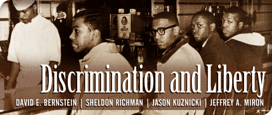Many concerns could be raised about racially restrictive deed covenants and the State, including:
1) the risk of defining “private action” out of existence;
2) the risk of the slippery slope (what other agreements might the State decide not to enforce?); and
3) the question whether enforcement or non-enforcement becomes a matter of public policy only because a coercive “public” agency – the State – has claimed a monopoly on enforcement. In contrast, in the private competitive legal system envisioned by Gustave de Molinari, the market (not to mention direct social action) could punish firms that honored racially restrictive covenants. But I’ll leave those considerations aside and confine my comment to but one area.
I should think that in a fully free society restrictive covenants in deeds would be unenforceable because they are feudal in nature and thus violate fundamental libertarian principles. A restrictive covenant constitutes a prohibition that “runs with the land” in perpetuity, permitting rule by the dead hand of the past. Under the covenant the buyer is said to be obligated not only to abide by the restriction himself, say, by never selling to a black person; he is also supposed to pass the restriction along in any resale. Why should that be enforceable? It has the appearance of a naked promise to perform or not perform some action in the future. How is it different from promising to marry someone and then changing your mind? If the restriction is violated, who has been wronged or deprived of just property? The former owner? How so? What if he dies? What about the owners of neighboring homes? Should they have legal recourse when they had no legal relationship with the buyer who violated the covenant?
I acknowledge that in throwing out the bathwater of racially restrictive covenants, I may also be throwing out some desirable babies. But my hunch is that the constructive things we might get from covenants could be achieved other ways. The virtue of my approach to invalidating racially restrictive covenants is that we would both strike another blow against racism and rid ourselves of the last vestiges of feudalism.

